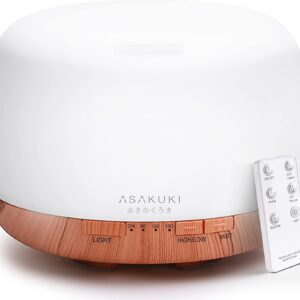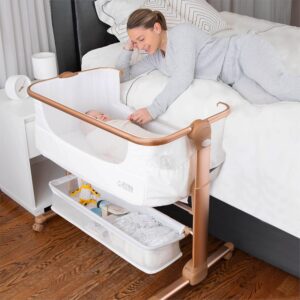Bringing your newborn home is a sweet moment, but it can also turn your world upside down. This will especially affect your sleep. Many new parents find themselves asking, “How do you get sleep with a newborn?” or “Will I ever sleep again?” Be patient—you are not alone.
Let’s talk about why sleep deprivation happens after welcoming your newborn and how long sleepless nights last. Most importantly, we will discuss how you and your partner can create a sleep schedule that works for newborn parents.
Understanding Newborn Sleep Deprivation:
Let’s not sugarcoat it: the tiredness you feel with a newborn is on a whole other level. It’s not just about being a bit sleepy – it’s a deep, bone-aching exhaustion because your body is healing and your world has been turned upside down, all while proper, deep sleep feels like a distant memory.
You might find yourself feeling:
- Really snappy and irritable over tiny things.
- Unbelievably forgetful – like walking into a room and completely forgetting why.
- Easily overwhelmed, crying at a cute babygrow or a kind word.
- Just physically drained, like you’ve run a marathon you never trained for.
This kind of exhaustion isn’t just about yawning. It messes with your head, making simple decisions feel impossible and turning your emotions up to eleven. That’s why figuring out how to grab even tiny bits of rest isn’t a luxury – it’s an absolute essential for surviving and thriving in this incredible, but knackering, new chapter. Getting any sort of routine, even a loose one, is a total game-changer.
Practical Tips to Get Sleep with a Newborn:
You can’t force your baby to sleep whenever you want. But there are smart ways to maximize your and your newborn’s sleep:
Share nighttime duties:
Create a parent sleep schedule with newborn care in mind:
- One partner handles feeding until midnight.
- The other takes over early morning shifts.
- If breastfeeding, one parent can bring the baby to feed, and the other handles diaper changes.
Sleep when the baby sleeps:
Forget the washing up! When your baby sleeps, you sleep. Seriously. Even a 20-minute power nap can reset your brain and body. It might sound like a cliché, but it’s the truest advice you’ll get. Those tiny pockets of rest add up and are essential for getting through the day.
Use safe co-sleeping tools:
A bedside bassinet is a genuis invention. It lets you keep your little one right next to you, making those night feeds quicker and easier, but in their own safe space. You can soothe them without fully waking up, which means more sleep for everyone.
Keep calm at nighttime:
During night feeds and changes, keep it dull. Use a soft, dim light, speak in whispers, and avoid any playtime. This helps teach your baby the difference between night and day and encourages everyone to get back to sleep faster.
Ask for help:
Don’t be afraid to ask for help! If a grandparent or friend can pop over for a few hours so you can crash, say yes! There are even postpartum doulas who specialise in night support. Accepting help is a sign of strength, not weakness.
Remember, this phase is temporary. By supporting each other and grabbing rest where you can, you’ll get through it together.
How Long Do Sleepless Nights Last with a Newborn?
Your baby’s tiny tummy can hold only a small amount of milk in the first few weeks. This means you have to frequently feed your newborn. Sometimes every 2-3 hours around the clock. Typically, the first 6-8 weeks are followed by an intense sleepless phase. After these weeks baby usually starts stretching its nighttime sleep to longer periods.
- 0–6 Weeks: Very fragmented sleep, multiple night wakings.
- 6–12 Weeks: Slight improvement; longer stretches (4–6 hours) may happen.
- 3–6 Months: Some babies sleep 6–8 hours at night, depending on development.
Every baby has different sleep patterns. However, most parents feel the worst of newborn sleep deprivation in the first two months.
Some Sleep Aiding Baby Products:
Here is a list of things that can help your baby to fall asleep fast:
- Swaddle Wraps or Sleep Sacks
- Bassinet with Vibration & Sound
- Smart Baby Monitor (with Sleep Tracking)
- White Noise Machine
- Crib Wedge (Reflux Pillow)
- Pacifiers (BPA-Free)
Why Sleep Deprivation Hits Harder Than Expected:

Let’s be completely honest: feeling completely overwhelmed isn’t just a possibility, it’s practically a given. There’s no shame in it whatsoever. Newborn sleep deprivation hits differently than any other kind of tiredness. It’s a perfect storm of physical and emotional demands that makes it feel so much worse.
Here’s why it’s so incredibly hard:
- Your Emotions Are on a Rollercoaster: For the birthing parent, those massive hormonal shifts after birth are no joke. They can make you feel incredibly raw and sensitive, so a lack of sleep feels ten times more intense. Everything just feels… bigger.
- The Sleep You Do Get Is Useless: It’s not just about fewer hours. It’s that your sleep is constantly broken into tiny, unsatisfying fragments. You never get enough of the deep, restorative sleep your body and brain desperately need to repair themselves. You’re running on empty, all the time.
- Your Brain Never Clocks Off: Even in the few moments you might be asleep, a part of you is still on high alert, listening for the baby. This constant, low-level worry – the mental load of being entirely responsible for a tiny human – is utterly draining in its own right.
- Your Body is Healing: It’s easy to forget, but your body has been through a major event and needs energy to recover. Demanding that it function on no sleep while it’s trying to heal is like asking a car to run a race with an empty tank and a flat tyre.
Understanding that this exhaustion is physiological and not a personal failing is so important. This isn’t a phase to just “power through.” Prioritising sleep isn’t a luxury or being indulgent; it’s a non-negotiable necessity for your health, your wellbeing, and your ability to be the parent you want to be. Taking it seriously is the first and most crucial step.
Create a Newborn Parent Sleep Schedule:
Every baby is different. But creating a flexible sleep plan can save your sanity.
Sample Parent Sleep Schedule with Newborn:
| Time | Parent 1 | Parent 2 |
| 8 PM – 12 AM | Sleep | Baby care |
| 12 AM – 4 AM | Baby care | Sleep |
| 4 AM – 8 AM | Sleep | Baby care |
In this way, each parent can get at least 4 hours of uninterrupted sleep, which is critical for their body and mind recovery.
Establish your sleep routine with:
- Night Light with Dim Settings
- Infant Massage Oil or Lotion
- Baby Bathtub with Temperature Control
- Portable Changing Pad for night time diaper change
- Comfortable Nursing Pillow
- Postpartum Recovery Pillow or Mattress Topper
- Eye Mask and Ear Plugs
- Thermos or Bottle Warmer for instant formula feeding
Some tips to make it work:
- Stay flexible. If the baby is unusually fussy, adjust.
- Use blackout curtains and white noise to help everyone sleep faster.
- Limit screens before sleeping to fall asleep more easily.
Sleep Deprivation and Mental Health:
Sleep deprivation with a newborn baby not only causes tiredness, but it also affects your mental health very badly. Many new parents feel lonely or emotionally drained. This is common in parents who remain awake during late-night feedings. It’s a combination of physical and mental challenges. Here are some tips to protect your mental health during sleepless nights:
Connect with other new parents:
One of the most powerful things you can do is connect with other new parents. Joining a local baby group or an online community can be a lifeline. Just hearing someone else say, “I feel exactly the same way!” makes you feel less alone. It normalises the struggle and reminds you that you’re not failing; you’re just going through a massive life change.
Talk openly with your partner:
Make a pact with your partner to check in with each other, honestly and without judgment. A simple, “How are you really feeling today?” can open up a crucial conversation. You’re a team, and taking care of each other’s emotional state is the glue that will hold you together. It’s about sharing the load, not just the chores.
Know the signs of burnout:
It’s vital to know the warning signs that you’re moving beyond standard exhaustion. If you’re feeling a constant sense of hopelessness, resentment towards your baby or partner, or feel completely emotionally numb, please listen to that feeling. This isn’t a character flaw. Postpartum depression and anxiety can affect any new parent, regardless of gender. Acknowledging these feelings is the brave first step toward getting the support you need and deserve.
Keep yourself relax and recharge:
These products will help you to relieve your stress and anxiety:
- Aromatherapy Diffuser with Lavender Oil
- Rechargeable Neck Massager or Heating Pad
- Sleep Supplements for Parents (Melatonin or Herbal)
- Co-Sleeping Bedside Sleeper (Safe Design)
You’re a human, and humans have limits. That is why feeling exhausted is not a sign of weakness. Initial weeks are a tough adjustment, but you don’t have to do it all alone.
When to Seek Help with Newborn Sleep Deprivation:
Sometimes the exhaustion reaches its peak level. No matter how much you try, you still feel tired. If your newborn’s sleep deprivation is causing a hindrance and disturbance in your ability to function or bond with your family and baby, consider these:
- Ask a family member or a friend to help you with night shifts
- Consult a certified infant sleep coach
- Talk to your pediatrician regarding your infant’s sleep patterns
- Hire a postpartum doula (if available)
Don’t associate help with weakness, it’s a strength. Keep in mind that there is no gold medal for doing it all yourself; it’s better to ask someone out for your well-being.
Bonus Healthy Sleep Tips for New Parents:
Let’s face it, surviving on newborn sleep is an art form. Here are a few little hacks that can make a bigger difference than you’d think.
Snack Like a Pro:
When you’re running on empty, reach for a protein-rich snack like a nut bar or some cheese. It gives you proper, lasting energy instead of the quick spike and nasty crash you get from sugary treats. It’s fuel for the marathon, not a sprint.
Give Yourself a Break. Seriously.
The house is a mess? You can’t remember the last time you had a proper shower? The routine you meticulously planned has gone out the window? Welcome to the club! This is all completely, totally normal. Be kind to yourself – you’re keeping a tiny human alive, and that’s more than enough.
Time That Caffeine Hit:
That morning coffee is a sacred ritual, but try to have it earlier in the day. A late-afternoon latte might seem like a good idea, but it can totally wreck your chance of grabbing a precious nap when the baby finally sleeps. Protect those tiny windows of rest!
Aim for a “Sleep Anchor”:
If you have a partner, see if you can take shifts to gift each other one solid block of “recovery sleep” – maybe a 4 or 6-hour stretch on a weekend. That chunk of uninterrupted sleep can feel life-changing and help your body and brain actually repair themselves. It’s the ultimate act of team love.
You’re doing an amazing job. Every little bit of rest you steal back is a victory.
Read about: What Is Postpartum Depression?
Frequently Asked Questions:
1: Can creating a newborn sleep schedule help?
Yes, a planned sleep schedule ensures the well-being of both parents. It also makes sure that each of you gets uninterrupted rest, avoids mental breakdowns, and improves overall family well-being.
2: How do I know if my baby’s sleep habits are normal?
The average newborn sleeps 14-17 hours/day in short bursts. If your baby is alert during wake time, growing, and feeding, chances are everything is on track.
3: Is it normal to feel resentment during newborn sleep deprivation?
Yes, many parents feel stressed, frustrated, and emotionally drained in this period. Talk about your feelings, acknowledge them, and try to find new ways to share the load.
4: How do working parents manage to sleep with a newborn?
Ask for support from family, friends, and coworkers. Accept that this phase is temporary. Communicate work and baby expectations. Take breaks when possible.
5: Do babies eventually start sleeping through the night?
Yes, babies start sleeping longer stretches by 3–6 months, although occasional regressions are normal.
Caring for a newborn is exhausting, beautiful, and fleeting. Learning how to get sleep with a newborn is an essential survival skill.
By building a flexible newborn parent sleep schedule, managing expectations, and supporting each other, you and your partner can weather the sleep deprivation storm together.























Add Comment